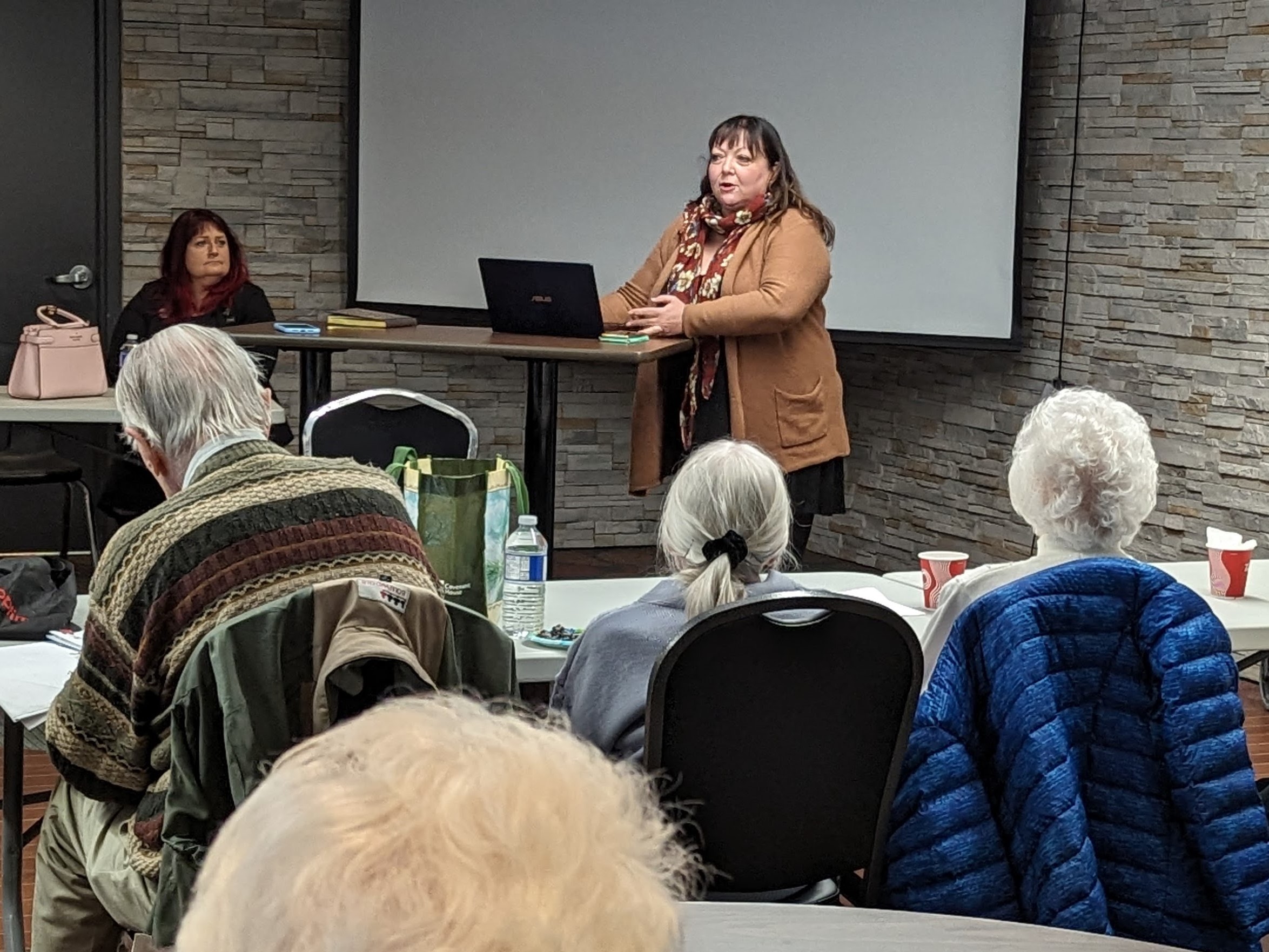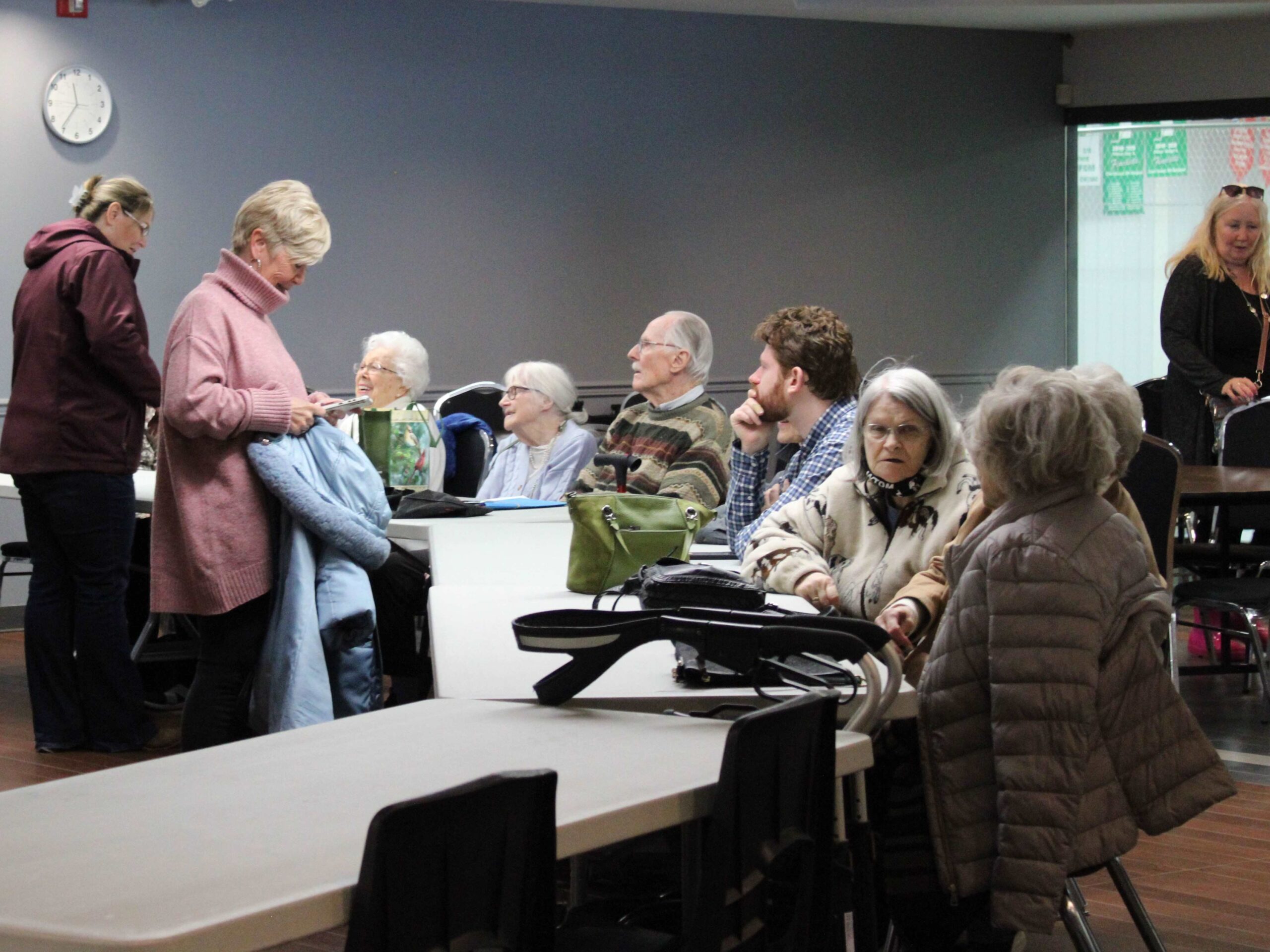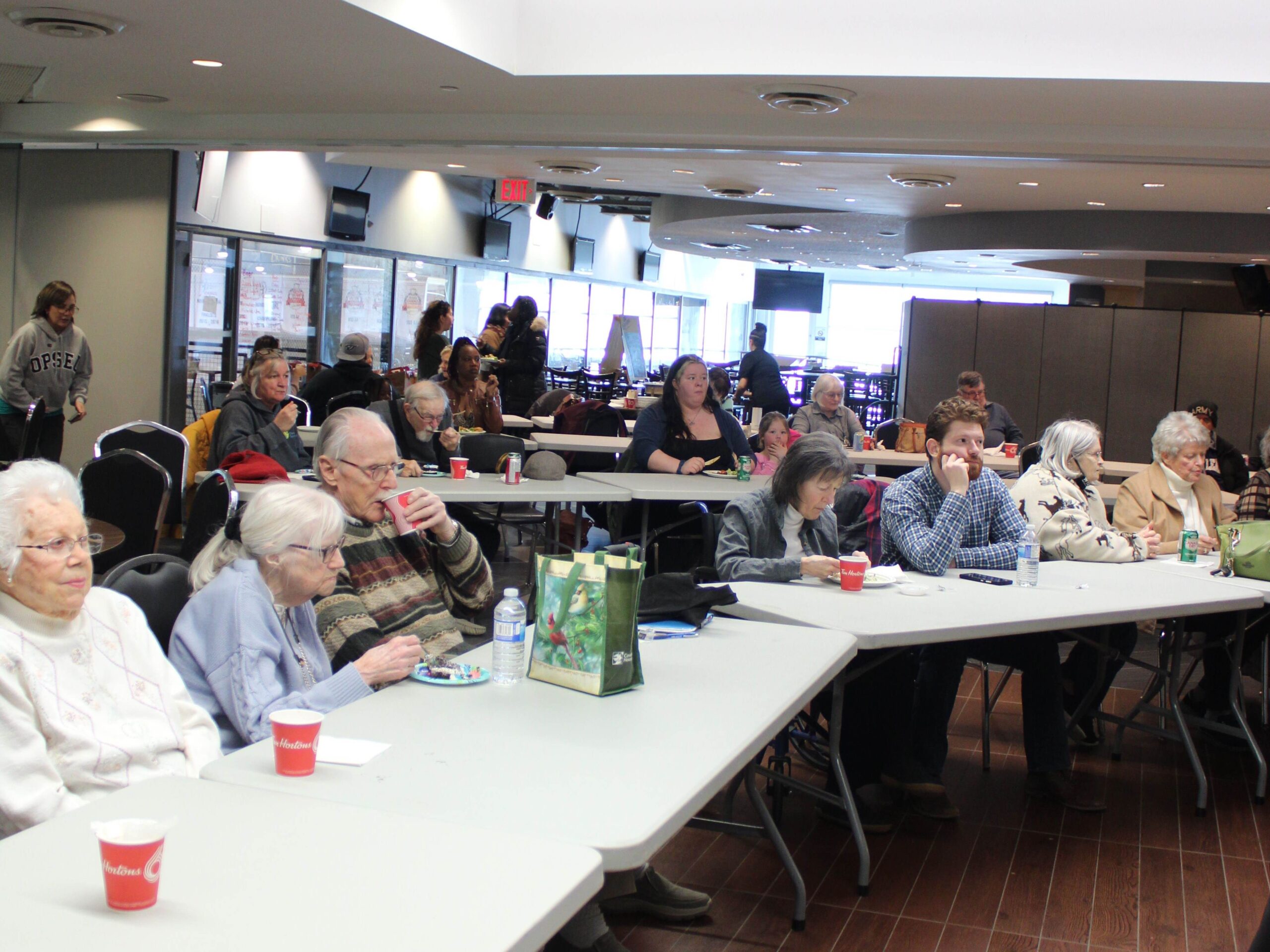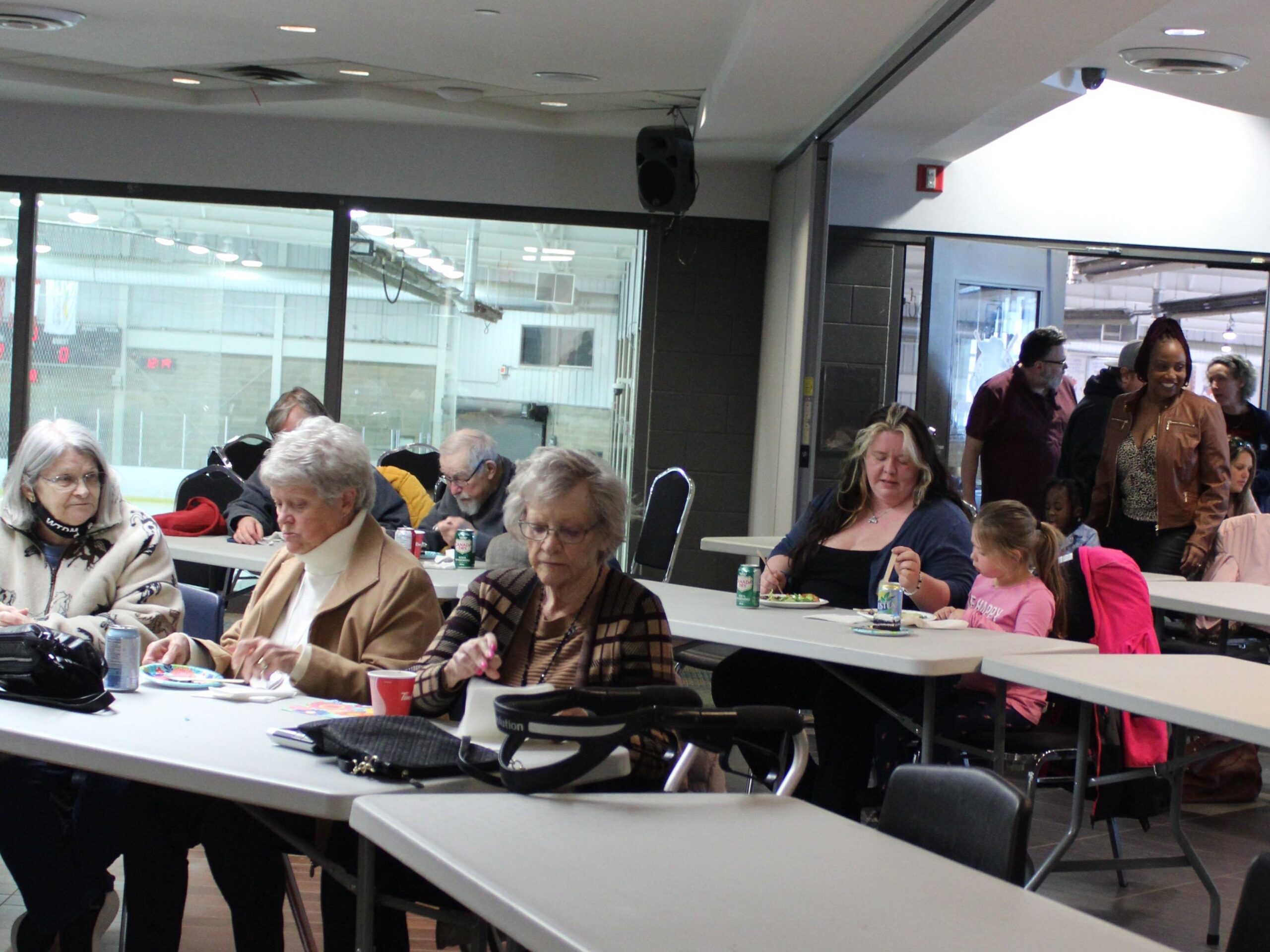Residents and staff of Aspira Kingsmere Retirement Living, owned by for-profit giant Sienna Senior Living, came together on Monday to talk about ways they could organize and work together to address quality of care issues at a town hall lunch meeting organized in Alliston by OPSEU/SEFPO Local 332. Together, residents, staff and guest speakers made the connections between low wages, understaffing, and the resulting quality of care issues at the home.
(Scroll to the bottom of this post to see photos from the event.)
Residents shared their concerns about the high fees they pay to Sienna Senior Living; the unwillingness of Kingsmere management to accommodate health needs such as dietary requests; understaffing and the lack of support they see from management towards staff; and the fear that many residents feel about speaking out or complaining, lest they be “kicked out” of the home.
Nevertheless, the residents were determined to work with staff and the broader community to bring about change at Kingsmere, and support the workers who care for them as they demand higher wages in bargaining with the home’s management.
As everyone ate a roast beef lunch together, catered by Mars Meals For You, they heard presentations from Natalie Mehra, Executive Director of the Ontario Health Coalition (OHC), Sara Labelle, Regional Vice President of OPSEU/SEFPO, Kirstie Byrne, Local 332 Unit Steward, and Theresa Krause, Local 332 steward.
Labelle opened the meeting by connecting the dots between quality-of-care issues for Kingsmere residents, and the severe understaffing there, due to most employees being paid less than a living wage. She noted that residents pay thousands every month to Sienna Senior Living, a for-profit corporation that raked in $800 million in revenues in a year.
“The conditions of care for residents are the working conditions for workers,” said Labelle. “There is a global shortage of workers in retirement homes, long-term care, developmental services, hospitals, and home care. Sienna Senior Living needs to pay a living wage to Aspira Kingsmere workers in order to keep them.”
“And they can afford it,” added Labelle. “Sienna’s CEO, Nitin Jain, makes $1.87 million per year. It will not hurt this organization in any way to provide a living wage.”
The living wage in Simcoe County is $22.75 per hour. More than half of Kingsmere staff (which includes PSWs, RPNs, dietary workers, housekeepers, concierges, and activity assistants) earn minimum wage, which is currently $16.55/hour. The starting wage for a PSW at Aspira Kingsmere is $19.19/hour, and $23.64 for an RPN.
Byrne shared her experience as a PSW and as the union’s Unit Steward at Aspira Kingsmere. “Rising food costs, gas and rent makes it challenging to continue to work at Kingsmere,” said Byrne. “We only have 13 PSWs when we should have 20. We only have one active full-time RPN when we should have three. We have three casual RPN nurses who are also employed at hospitals in our area. But they can’t give up their regular shifts at the hospital, which pays them $30 per hour.”
Both Byrne and Labelle chastised Sienna Senior Living for filling their staffing gaps with agency workers which costs double the wages of a Kingsmere employee. “They are willing to pay an agency $35.00 per hour for a PSW, and over $60 per hour for an RPN,” said Byrne. “Why are they willing to pay an agency so much more than their own employees?”
Sienna Senior Living CEO Nitin Jain sent out a communication to all staff in March 2021, titled “A Year of Courage: Heroes work here,” telling them, “On behalf of Sienna Senior Living, thank you – we will always think of you as heroes.”
“Throughout the pandemic, we were all praised for our devotion, dedication, long hard hours and hard work,” added Byrne. “Now we are underpaid and understaffed superheroes.”
Krause, who has been a server at Kingsmere for not quite a year, said that only one person has been there longer than she has, of all the part-time serving staff. “Unfortunately, my position is one that people only accept until something better comes along,” she said.
“The same is true with housekeepers, concierges, and social engagement staff,” Krause added. “Why? Because many of us only make minimum wage even though we work in a highly specialized environment with some of the most vulnerable people in our community. We understand, and we agree that we don’t accept gratuity or tips as we would if we worked in a hotel or restaurant, in order to protect our residents.”
Several residents requested an update on how bargaining was progressing between the union and Aspira Kingsmere management.
“Their contract expired a year ago,” responded their OPSEU/SEFPO Staff Representative, Greg McVeigh. “As you know, more than half of the bargaining unit is making minimum wage. Minimum wage goes up every October, and the wages that Sienna offered the workers were less than what the minimum wage will likely be this fall. We asked that they bring all employees up to the living wage of $22.75/hour, but Sienna rejected that.”
McVeigh explained that Kingsmere staff have the right to go on strike, but Sienna Senior Living is now applying to the Labour Board to have themselves declared a hospital so that staff would be forced to go to binding arbitration under the Hospital Labour Disputes Arbitration Act and be barred from striking.
“Under binding arbitration, our increases would be very low, and right now, our best bargaining power is to have the right to strike, not necessarily that we would,” said McVeigh. “It’s one thing to declare yourself a hospital. It’s another thing to pay fast food wages.”
Labelle added, “If they want to treat our members at Kingsmere like hospital workers, then pay them like hospital workers.”
Natalie Mehra wasn’t surprised by the issues raised by the workers and the residents. She talked about the way for-profit corporations like Sienna Senior Living failed long-term care and retirement home residents during the pandemic because of drastic understaffing. The dire conditions led to the Canadian Forces being sent into long-term care homes owned by Sienna Senior Living and others to clean up the mess.
One resident asked Mehra whether there were any consequences for those homes. “After the military report was leaked to the press, Doug Ford held a press conference and appeared to cry, saying that there would be accountability, criminal charges, fines, license suspensions, the whole thing,” said Mehra.
“What actually happened is that they brought in legislation that shielded the for-profit operators from lawsuits for negligence,” Mehra continued. “No one got fined. No one lost their license. Nothing happened to them. And now the Ford government is in the midst of giving out 45,000 new licenses for long-term care beds, the majority of which are going to those same for-profit chains.”
Mehra told the group how the Ontario Health Coalition has filed a lawsuit against the Ministry of Long-Term Care, demanding that they obey legislation that requires the Ministry not to approve new licenses for operators like Sienna Senior Living, who have not met safety and welfare standards in the past. She also outlined the importance of taking political action on understaffing and poor quality of care in for-profit retirement homes, given that successive governments have allowed for-profit corporations to take over long-term care and retirement homes over the past three decades.
“In the next election, we have to make seniors’ care a key issue across the board – retirement homes, long-term care, home care, chronic care and hospitals,” said Mehra.
Labelle emphasized that the ultimate goal should be to make all retirement homes and long-term care homes, including Aspira Kingsmere, publicly-owned, and publicly-run in order to take the profit motive out of care for seniors.
The meeting concluded with Kingsmere residents, staff, OPSEU/SEFPO union representatives and Mehra from the Ontario Health Coalition planning ways that they can work together on organizing in their retirement home and in the broader community of Alliston to make conditions better at Kingsmere for both residents and staff.
Quality of Care Town Hall Photos



















